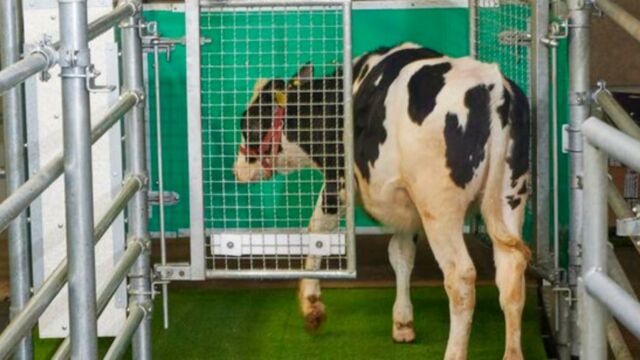Cows undergo potty-training to help reduce urine pollution

Scientists trained the calves to urinate in designated spaces in a bid to reduce the impact of animal waste pollution on the environment.
New research shows that not only can cows be potty-trained, they are more likely to learn to urinate in designated areas, faster than human toddlers.
Discover our latest podcast
Scientists in Germany have successfully trained 11 out of 16 cows to use the MooLoo—an astroturf-covered pen that serves as a designated urinal for cows - as a possible solution to the threat of animal waste pollution to the environment.
More under this adMore under this adPotty-Training
According to a study published in the journal Current Biology, the researchers rewarded the cows with a highly sweet liquid of mostly molasses anytime they urinated in the MooLoo. Cows that urinated outside the pen received a squirt of water.
It took the scientists 15 days to successfully train the 11 cows to use the pens. The cows that successfully potty-trained acquired the full set of skills within 20 to 25 urinations.
More under this adMore under this adStudy senior author Lindsay Matthews, who is also an animal behavioural scientist at New Zealand’s University of Auckland, said:
The cows are at least as good as children, age 2 to 4 years, at least as quick. This is very exciting because it means they were paying attention to their bladder getting fuller.More under this adMore under this ad
Toxic Waste
Urine contains nitrogen, which when mixed with faeces becomes ammonia—a huge environmental issue that causes acid rain.
Ammonia also has the ability to change the colour of water with its nitrates content, thereby producing a dangerous pollutant, nitrous oxide.
More under this adMore under this ad
This problem is more pressing with livestock rearing because a single cow is estimated to produce about eight gallons of urine a day, according to Matthews.
More under this adMore under this adWith this toilet training program, scientists would be able to treat cow-urine in a more sustainable way to reduce the environmental impact of the toxic substances produced by such waste.
Douglas Elliffe, a professor of psychology at the University of Auckland who helped design the program, said:
If we could collect 10% or 20% of urinations, it would be sufficient to reduce greenhouse gas emissions and nitrate leaching significantly. We’ve shown proof of concept that we can train cows and train them easily.More under this adMore under this ad